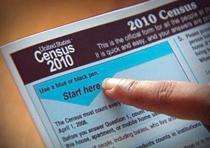Probing Question: Why is the census important?

Every 10 years, the U.S. Census Bureau undertakes a mammoth task: counting all of the people living in the United States and recording basic information such as age, sex, and race. The United States' founders thought these data were so important they mandated it as part of the Constitution. But today, some people question the importance of the census, and some complain that it's an invasion of privacy.
So why do we have a census, and what is the information used for?
"The census is most definitely important. Our whole representative democracy is based on it," said Gordon De Jong, professor of sociology and demography and senior scientist in Penn State's Population Research Institute. "The census ensures that each community gets the right number of representatives in government." Because representation is based on population, an up-to-date tally is essential.
The census also helps with the equitable distribution of public funds, De Jong said, as federal and state funding for educational programs, health care, law enforcement and highways is allocated based on population, in part. "Equitably distributing the billions of dollars of public money requires up-to-date population data."
In broad terms, the census helps us see how the United States is changing. In the 2000 census, 281.4 million people were counted in the United States, an increase of 13.2 percent from the 1990 census population of 248.7 million. The highest rates of population growth were reported in the South and West.
The Census Bureau is nothing if not persistent. "For the decennial [every 10 years] census, first, questionnaires are mailed out to every household," De Jong explained. "If these are not returned, then this is followed by a second mailing and phone calls. If there is no response, then a census worker will visit the household."
However, for a more accurate profile, demographers need more than the basic information mandated by the decennial census, De Jong said. The American Community Survey (ACS) fills the gap. This annual survey provides information on 46 topics, including income/poverty, employment status, and education level. "About 3 million households are chosen annually as a representative sample of the whole country," he said.
The information provided by the ACS can help lawmakers design new legislation, De Jong said. "I was involved in initiating the Children's Health Insurance Program in Pennsylvania, known as CHIP. To get that going, we had to know how many children in the state were uninsured, and the best way to get an accurate, trustworthy source of that information was from a Census Bureau survey."
While census data are useful to lawmakers, the same information may be of interest to marketing companies, political groups, and even nosy neighbors curious about the family next door. For this reason, some people are reluctant to participate in the census, including U.S. Representative Michele Bachmann (R-Minn.). Bachmann spoke out about her census concerns in a recent "Good Morning America" interview, commenting that the census has become "very intricate, very personal." She expressed fears that partisan political groups might be part of the Census Bureau's door-to-door information collection efforts.
Could census data fall into the wrong hands?
"The data from the decennial census and all Census Bureau surveys, including the American Community Survey, are protected by law," said De Jong. "Personal information like names and addresses can never be released. Statistical summaries of the data for geographic areas and political units are available on the Web, but there is no way that individual households could be identified based on their responses, and the Census Bureau has training to ensure that employees handle the data responsibly."
For De Jong, the civic duty of taking part in the census far outweighs other concerns. "The census was mandated by the Founding Fathers as the basis for our republic -- our way of government."
If civic duty isn't enough to motivate you, refusing to participate in the decennial census is punishable by a fine of up to $5,000.
Source: by Solmaz Barazesh, Research/Penn State















